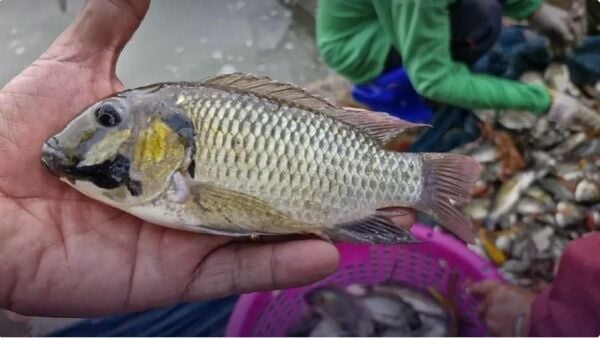Samut Songkhram takes bold steps to save aquatic ecosystem

To save Thailand’s aquatic ecosystem, the Samut Songkhram Provincial Fisheries Office launched a campaign against the invasive black chin tilapia species.
Amidst concerns over the blackchin tilapia’s relentless invasion of natural water resources linked to vital rivers, the Tha Chin and Mae Klong, authorities are taking decisive action.
The Samut Songkhram Provincial Fisheries Office took centre stage yesterday, unveiling a vigorous campaign aimed at eradicating the blackchin tilapia, a nefarious alien species wreaking havoc on the delicate ecosystem of lower central Thailand’s water resources.
Part of an overarching initiative declared by the Ministry of Agriculture and Cooperatives last month, this campaign targets the encroachment of black chin tilapia into fish farms across provinces, posing a dire threat to fishing resources.
In its inaugural phase, the campaign’s scope spans five provinces: Bangkok, Samut Sakhon, Samut Songkhram, Samut Prakan, and Phetchaburi. Local fishermen, farmers, community members, and government officials banded together yesterday, March 20, to tackle the infestation of black chin tilapia in a reservoir adjacent to Samut Songkhram City Hall in Mueang district, employing ministry-approved specialised nets.
Bundit Kullawanich, chief of the Samut Songkhram Provincial Fisheries Office, outlined plans for monthly activities across canals and reservoirs linking with the Mae Klong River to ensure the complete eradication of the alien species.
In addition to direct action, the office aims to heighten awareness among local fishermen regarding the blackchin tilapia’s life cycle and its detrimental impact on the ecosystem through a series of informative exhibitions. Visitors are enticed to explore booths showcasing products crafted from the alien fish, ranging from crackers to sausages and Pan Klip (deep-fried mini curry puffs).
Bundit highlighted the resourcefulness in utilising tilapia leftovers, repurposing them into fish meal for animal feed or fertiliser, reported The Nation.
There are about five reasons the black chin tilapia poses a dire threat to fishing resources:
- Habitat Disruption: Black chin tilapia can outcompete native fish species for food and habitat, leading to a decline in the population of indigenous fish species. This disrupts the natural balance of the ecosystem and can result in a loss of biodiversity.
- Altered Ecosystem Dynamics: Their presence can alter the structure and function of aquatic ecosystems. They may consume large quantities of aquatic vegetation, which can affect water quality and reduce habitat availability for other species.
- Economic Impact: As an invasive species, black chin tilapia can negatively impact commercial and recreational fisheries. They may compete with commercially valuable fish species for food and space, reducing catch yields and potentially leading to economic losses for fishing industries.
- Spread of Disease: Invasive species like black chin tilapia can also introduce and spread diseases to native fish populations, further compromising the health and stability of aquatic ecosystems.
This multifaceted approach underscores the province’s commitment to restoring ecological balance amidst the invasive threat.
Latest Thailand News
Follow The Thaiger on Google News:


























